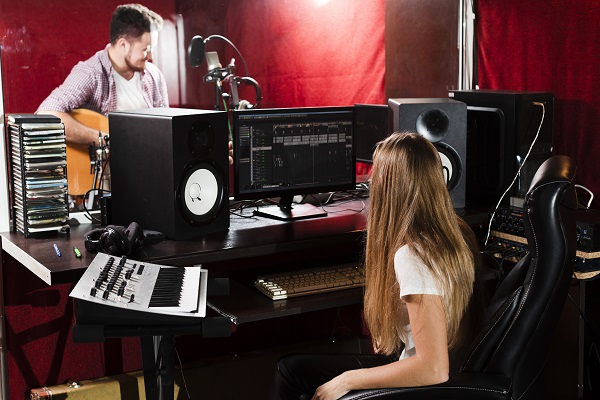Recent Stories
Filtered by: Living / Careers in Music Production
29,
2023
Careers in Music Production
Posted In: Living | Posted By: Matt

Are you interested in a career in music production?
Explore the different types of music production, educational requirements, salaries, professional opportunities, skills and qualifications, and working conditions.
Discover the many ways that you can pursue a career in music production and find the right fit for you.
With the right knowledge and experience, you can create a successful career in music production.
Key Takeaways
-
Music production is an ever-evolving field, so staying up to date on trends and technologies is crucial.
-
Music theory and sound engineering courses are often required for a career in music production, but formal education is not necessary in all cases.
-
Music producers can earn competitive salaries and enjoy benefits such as networking opportunities and access to industry trends.
-
Networking is essential for building relationships and advancing a career in music production, and there are various professional opportunities available, including working in recording, radio, or live sound, as well as teaching, mentoring, and consulting.
Types of Music Production
When it comes to music production, there are several types you can pursue.
For example, you can specialize in music selection, which involves selecting the right music for a certain project. This could involve choosing music that's popular, or choosing a more unique selection of music.
Another type of music production is sound engineering. This type of production involves manipulating sound to create a desired effect. It could involve adjusting the volume of the track, adding effects, or using EQ to shape the sound of the track.
Music production is an ever-evolving field, and there are always new techniques to explore and create with.
No matter what type of production you specialize in, it's important to be creative and precise in your work. Music production requires a lot of skill and attention to detail, so make sure you stay up to date on the latest trends and technologies.
Education Requirements
Frequently, aspiring music producers must obtain an education in order to pursue their desired career. Music theory and sound engineering courses are often required, as they equip producers with a comprehensive skill set necessary for success. Additionally, courses in composition, arranging, and audio technology are highly beneficial.
While formal education isn't necessary in all cases, it's often the best way to gain the knowledge and experience needed to compete for the best jobs. Furthermore, many employers look for applicants with a degree in music production or a related field. Thus, pursuing a degree or certification in music production can be a valuable investment.
Depending on the institution, students may also be able to take courses in business and marketing, which can help them develop the skills necessary for success in the music industry.
Salaries and Benefits
As a music producer, you can expect to earn a competitive salary and enjoy numerous benefits. Networking opportunities, access to industry trends, and exclusive events are just a few of these benefits.
Working in the music industry gives you the opportunity to be part of a creative and unique community. You may also have access to special resources, such as discounts on various recording equipment, software, and other supplies.
Being a music producer also allows you to be part of a rewarding career where you can make a significant impact on the industry. In addition, you can take advantage of the networking benefits that come along with the job, such as meeting influential music industry professionals and even collaborating with other producers.
With the ever-changing music industry trends, a career in music production can be both challenging and rewarding.
Professional Opportunities
There are numerous professional opportunities available to music producers. Networking opportunities are essential for building relationships, gaining knowledge, and advancing one's career.
Music producers can utilize their connections to develop career paths in different areas of the industry such as recording, radio, or live sound. Additionally, they can use their skills to teach, mentor, or consult.
It's important for music producers to stay up to date on industry trends and technology, as it can give them a competitive edge. By building a strong portfolio of work and connecting with the right people, music producers can open the door to a range of opportunities.
With hard work and dedication, music producers can make a long-term career in the industry.
Skills and Qualifications
In addition to networking, having the necessary skills and qualifications is key to success in the music production industry. To be successful, producers must possess many creative and technical abilities, such as creating beats, audio engineering, and understanding the fundamentals of music theory. They must also have excellent communication and organizational skills, as well as a comprehensive understanding of digital audio workstations.
In addition to technical skills, producers must also have a strong understanding of the music industry. This includes knowledge of copyright law, licensing, distribution, and marketing. It's important for producers to stay up-to-date on trends in the industry and to network with other professionals in order to stay competitive.
Working Conditions
Once you have the necessary skills and qualifications, it's time to consider the working conditions of music production.
Generally, the hours are flexible, with some producers working during the day and others preferring to work late into the night.
You may have to attend networking events, such as industry mixers, to find new opportunities. Additionally, you should stay up to date with industry trends to stay ahead in the game.
Depending on the project, you may need to travel to different studios, which can be both exciting and demanding.
You may also need to work with a variety of people, so it's important to be able to adapt to different personalities.
Check out YourAudioFix.com for more information about music productions.
Conclusion
Music production is a rewarding career that requires dedication, creativity, and technical skill. It offers a variety of professional opportunities, with salaries and benefits that vary depending on experience and location.
To be successful in this field, you must have a passion for music and the drive to stay ahead of the curve. With the right qualifications and experience, you can have a successful career in music production and create a life you love.
You might also like

I help people discover innovative products and ideas to live more simply, beautifully, and creatively. Read more.




































